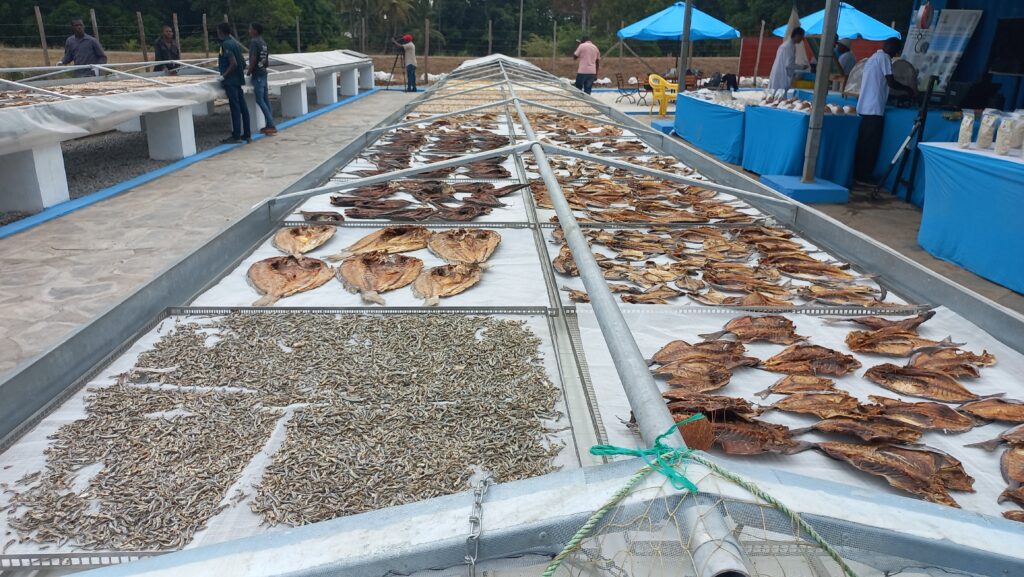By Mwanasiti Salim and Hellen Awinos
The Kenya Marine and Fisheries Institute (KMFRI) in collaboration with the Kenya industrial research and development institute (KIRDI) has launched the SolCoolDry project to help to reduce food spoilage among farmers in the south Coast Region.
Solar attracts a lot of heat, about fifty degrees which is favorable for preservation.
Fishermen along the Coastal region will now have no reasons to watch as their daily catch go to waste due to lack of storage since post-harvest loss will be a thing of the past.
The temperature helps in killing bacteria that might affect the fish, lowering its quality and also draining the moisture that’s attracts bacteria and mold thus increasing the quality of fish as the senior research scientist KMFRI, Dr Peter Odote states.
The SolCoolDry also targets drying of fruits and other food materials that can be preserved after drying.
Lucy Wanjiku an Engineer and a board member, KIRDI added that the project is not only aimed at increasing yield but also to train people on how to apply on the new technology introduced.
The project will have a lot of impact by creating job opportunities, keeping young people engaged, keeping family stable and also increasing food security in the county.
‘this is one project that will ensure there is food because there will be no room to waste it but storing for use in future or selling it for money,” she said.
The solCoolDry project is simple and cheap since it uses sunlight energy compared to electrical preservations methods and also recycling energy in the economy.
Dr. Linus Osambo , senior research scientist at KIRDI explained further that each drier has twenty four trays and that every tray can carry five to ten kilogram of fish and each drying rack is twenty four meters long
“Every drier can dry two hundred and forty kilogram of fish at once, leading to an approximate of four hundred and eighty kilogram of fish per day,” he added.
It has also been observed that there has been cases of fish spoilage in Tana River County after harvest in areas with the modern technology once embraced said to be the solution to such situations.
In Gazi and Vanga areas in Kwale County, dagaa is highly harvested especially in the month of April with lack of storage facilities like the driers affecting fishermen who depend on the fish business to feed their families.
“The project will be of help since we have encountered more than enough losses.” Says Dr. James Mwaluma.
One of the fishermen in Kwale Mshemanga Hamisi and Shimoni Fishermen project coordinator added that they are highly privileged with the project as they won’t be eating spoiled fish , the method will contribute to selling of fresh fish to the market .
“For those who fetch fish from Kibuyuni, Shimoni and Mwazaro taking them to Kikoneni will have no worries,” he says adding that Ice flakes are being sold to as low as ten shillings per kilogram.
Where fishermen have more fish than they can sell for a day, they are dried to be sold later since they can stay as long as six to 12 months dry.
The dry fish are now adequately available at least they will earn income from their sales helping stabilize their families. Amina Salim, a fish monger concluded.
“We are very lucky to have this project here in Shimoni because with the Ice flakes we can place our fish while along the beach in the cooler box to avoid them rotting. When we have many fish we dry them so that they can be sold later,” she said.
In conclusion, the grand opening of the So Cool Dry System at Mwazaro-Shimoni in Kwale County was a huge success, with a large turnout of local citizens and government officials.
This innovative machine will not only help the local fishing industry, but will also help solve issues such as food security, job creation, and tapping into green energy and recycling.
The So Cool Dry System is a shining example of how technology can be used to create positive change in communities.


